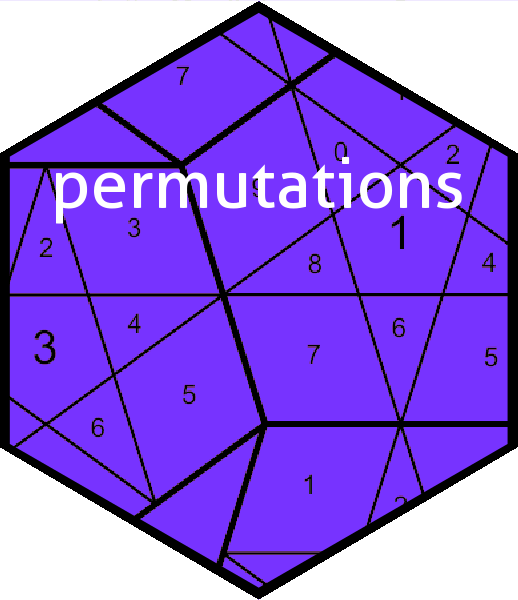

The permutations package provides R-centric functionality for working with permutations of a finite set. It includes group-theoretic composition of permutations and can transform from word form to cycle form and back.
You can install the released version of permutations from CRAN with:
# install.packages("permutations") # uncomment this to use the package
library("permutations")
#>
#> Attaching package: 'permutations'
#> The following object is masked from 'package:stats':
#>
#> cycleThe package is maintained on github.
permutations
package in useRandom permutations on a finite set are given by the
rperm() command:
(x <- rperm(10, 9))
#> [1] (19524)(37) (1238794) (1745682)(39) (15)(3897)(46) (132654789)
#> [6] (17263)(59) (136)(47589) (162)(4795) (14763)(259) (168347925)
#> [coerced from word form]Above, object x is internally stored as a matrix (word
form) but the result is printed in cycle form by default, as this is
easier to understand. We can print in word form if we wish:
options(print_word_as_cycle = FALSE) # override default
as.word(x)
#> {1} {2} {3} {4} {5} {6} {7} {8} {9}
#> [1] 9 4 7 1 2 . 3 . 5
#> [2] 2 3 8 1 . . 9 7 4
#> [3] 7 1 9 5 6 8 4 2 3
#> [4] 5 . 8 6 1 4 3 9 7
#> [5] 3 6 2 7 4 5 8 9 1
#> [6] 7 6 1 . 9 3 2 . 5
#> [7] 3 . 6 7 8 1 5 9 4
#> [8] 6 1 . 7 4 2 9 . 5
#> [9] 4 5 1 7 9 3 6 . 2
#> [10] 6 5 4 7 1 8 9 3 2
options(print_word_as_cycle = TRUE) # restore default: we usually want to print a cycle irregardless(A dot indicates a fixed point). The package uses arithmetic
operations * to combine permutations and ^ for
conjugation:
(a <- as.word(c(4, 2, 3, 1, 5, 7, 6)))
#> [1] (14)(67)
#> [coerced from word form]
(b <- as.cycle(1:4))
#> [1] (1234)
a * b
#> [1] (234)(67)
#> [coerced from word form]
b * a
#> [1] (123)(67)
#> [coerced from word form]The megaminx is a dodecahedral puzzle with similar construction to the Rubik cube puzzle that has 50 movable pieces and 132 coloured stickers (“facets”). The permutations package includes functionality to simulate the megaminx and exhibits an 82-turn superflip. The vignette gives an extended discussion.